 |
|
 |
|
Booklist
|
| |
|
|
|
|
Techniques |
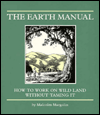 |
The Earth Manual
by Malcolm Magolin
ISBN 0-930588-18-5, published by Heyday Books
This book's subtitle says it all: "How to work on wild land without taming it".
235 Pages, with many explanatory diagrams. Excellent! |
|
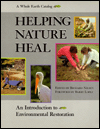 |
Helping Nature Heal
A Whole Earth Catalog, edited by Richard Nilsen
ISBN 0-89815-425-1, published by Ten Speed Press
Full of articles, photographs, and stories about Caretaking. Includes mini-reviews
of related books. |
|
 |
Ecodefense: A Field Guide to Monkeywrenching
by David Foreman
Please note that a lot of the activities described in this book are
highly illegal. The listing of this book here does not imply that
Earth Caretaker or the Webmaster advocate such activities! As it says
in the forward, "For entertainment purposes only"! |
|
 |
The One Straw Revolution: An Introduction to Natural
Farming
by Masanobu Fukuoka
"On this planet we do not have something we can
call Nature any more. We have lost it. We do not have Nature we can go
back to. What we must do is search for Nature. But human knowledge cannot
do it. We can only ask Nature. So we, and especially seed companies in the
world, should collect all kinds of seeds on the planet, and offer them to
God, Nature and pray. This kind of attitude toward Nature is necessary. Of
course, even if we pray, God will not say anything. We may not be
inspired, either. But the plants which start growing are God's answer.
Nature will teach you." - M. Fukuoka
|
|
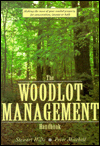 |
Woodlot Management
|
|
|
|
|
Plants |
|
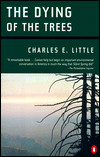
|
The Dying of the Trees
By Charles Little |
|
|
|
|
Wildlife |
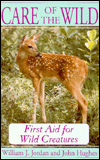 |
Care of the Wild:
First Aid for Wild Creatures
by William J. Jordan & John Hughes
ISBN 0-299-13184-X, published by The University of Wisconsin Press
Although you obviously can't learn wildlife rehabilitation from a
book, this book gives a good overview of first aid for wild
creatures. |
|
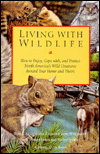 |
Living With Wildlife: How to Enjoy, Cope with, and Protect North America's Wild
Creatures Around Your Home and Theirs
by The California Center for Wildlife, with Dianan Landau & Shelley Stump
ISBN 0-87156-547-1, published by Sierra Club Books
This book identifies and describes more than 100 species of wildlife, explains how
wildlife-human interactions can lead to conflicts, and offers advice on how to resolve
them. |
|
 |
Peterson’s Field Guide "Birding By Ear".
"This
is a wonderful set of tapes (or CDs) designed to help one to learn to distinguish birds by
their songs. Unlike other bird song audio’s, it groups birds by similarity of song
rather than by the normal taxonomic organisation and points out the similarities and
differences between the calls, much like Peterson's Field Guide to the Birds would point
out the physical differences between similar appearing birds. There are separate editions
for the East and West. An excellent way to become more familiar with the sounds of birds,
and not have to rely on actually seeing them to know which birds are inhabiting an area."
Reviewed by Bill Sydor
|
|
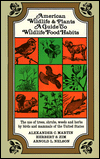 |
American Wildlife & Plants: A Guide to Wildlife Food Habits
by Alexander C. Martin, Herbert S. Zim, Arnold L. Nelson
ISBN 0-486-20793-5, published by Dover
This book details the use of plants by birds and mammals of the United States and Canada.
It first lists, for each bird and animal, what plants they each eat. It then lists, for
each plant, what birds and animals eat it. An excellent reference. |
|
|
|
|
Philosophy |
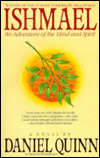 |
Ishmael
By Daniel Quinn
"I have read all of Daniel Quinn's books: Ishmael,
The Story of B, My Ishmael, Providence, Beyond Civilization, After
Dachau, The Man Who Grew Young.
I can honestly say that I think Daniel Quinn's books
will save the world. And by "world" I mean human
biosphere. The world will continue with or without humans as we all
know.
Quinn brings something out in the reader that has been
there since we have walked this earth.
Ishmael (Quinn's fictional character) doesn't preach to
us, and doesn't give us (the reader) the "final" solution
or program to solve all of our problems. What he does do is
challenge each and everyone one of us to rethink our cultural myths
that has been instilled in our minds since we were born. Ishmael
paints a beautiful picture on how things came to be the way they
are. And than leaves it up to the reader to take the knowledge he
has been given to do what he wants with it. Caution! You will never
see our world and culture the same again.
To anybody who has followed the teachings of
Grandfather (Tom Brown's Mentor), and who wishes they could have the
same kind of teacher. Ishmael is it! Ishmael may not teach you how
to track, listen to birds, or view nature, but he uses the same kind
of teaching method Grandfather did. The reader is than forced to
answer questions that have been brewing inside since we were
infants.
What Ishmael brought forth in me was simple. We are not
humanity, humans were not created flawed, our way is not the ONE
right way to live, and we weren't created to be rulers of this
world. We are just a part of the sacred process of life.
If any reader gets done reading this book and wants to
seek out "like minded" people, the Ishmael website and
guestbook (www.ishmael.com)
is the place to do it. Thousands of "like minded" people
visit there everyday to share new ideas and here new ones.
If the world is gonna be saved. It will be saved by
changed minds with a new vision." (Reviewed
by Curt) |
|
|
|
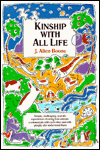 |
Kinship With All Life
by J. Allen Boone
"Is communication with animals possible? In a book that has changed many
people's lives, including my own, the author writes of his relationship with an amazing
dog named Strongheart. By allowing the animal to become his teacher, he slowly learns how
to engage in a two-way exchange with Strongheart and, eventually, with all animals.
The book follows the day-by-day discoveries that Boone makes in his
quest to be able to "talk" with Strongheart. Recognising the dog as an equal
being with admirable qualities and abilities, the writer builds "a bridge"
across which communication becomes possible.
In addition to Strongheart's story, the book contains experiences with
such diverse beings as rattlesnakes, horses, and a house fly named Freddie. A second book,
The Language of Silence, picks up where Kinship ends, sharing Boone's
experiences with a monkey named Joe, pack rats, gophers, and other animals." Reviewed by
Cindy Kamler |
|
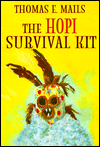 |
The Hopi Survival Kit
by Thomas Mails
"New in '97…includes Hopi
prophecies, guideline for living in balance (as given to the Hopi 1000 years ago by the
Creator), and an invitation to work with them in ceremony, prayer, and simplified
lifestyles." Reviewed by Dale McMillan
|
|
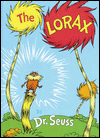 |
The Lorax
by Dr. SeussA modern fable about what happens when greed dictates the fate of nature.
|
|
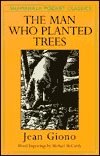 |
The Man Who Planted
Trees
by Jean Giono |
|
 |
A
Language Older Than Words
by Derrek Jensen
"Derrick
Jensens book and his website
are totally amazing. Derrick uses his experience as a abused child
to compare it to the destructiveness of our culture. And how the
effect of the macrocosm of our culture trickles down to microcosm in
our relationships. Beware: dangerous reading ahead! If this book
don't wake you up, I don't know what will."
(reviewed
by Curt) |
|
|
|
|
Caretaking Stories and Experiences |
|
|
 |
Don Coyote
by Dayton O. Hyde
ISBN 0-345-34704-8, published by Ballantine Books, 1986.
"Dayton Hyde is a cattle rancher in the Klamath River area of Oregon.
His uncle, from whom he bought the ranch, didn't kill coyotes, so neither does he. But he
doesn’t know much about these much-aligned, persecuted predators until a wary
friendship begins between him and a young male coyote. The Don, as Hyde comes to call him,
had dug in under a broken-down tractor, Big Alice, where the rancher could often find him.
As the relationship grows and deepens, his family teases him and some
of his neighbours threaten him, but Hyde develops a growing awareness of the role that
predators play in maintaining the natural balance. He begins to think about the "old
days" on the ranch when he was a teenager. He compares some of the things the
old-time ranch hands had taught him with the ranching practices of the present: ". .
. I became aware of some differences between me and the ranchers around me. . .Since Don
Coyote had come into my life, my attitudes toward the land had changed. . .they figured we
humans had dominion over the land while I felt we had a responsibility for it for the
soil; for every plant, bird, and animal that shared this planet with us; for the rivers,
and for the air."
As Hyde's thinking changes and his awareness grows, he learns more
about coyotes by raising some pups, manages his water differently, goes back to native
grasses, and even re-creates an ancient lake by building an earthen dam. After months of
hard work by him and his family, Hyde notices the changes on his land. His cattle are
flourishing. Bird life becomes abundant; there are fish in the lake and bald eagles in the
trees. Coyotes keep down the ground squirrels and voles, and ducks, meadowlarks, foxes,
and flickers control the grasshoppers. Natural marshes and ponds retain the sun's heat and
fight off damaging frosts. "Nice things were happening. For the first time I could
see a system working on the land. Nature was beginning to achieve some sort of
equilibrium. We were at peace with the land, working with Nature instead of attacking her
head on."
Dayton Hyde writes with insight, humour and compassion. He draws a
vivid picture of his land and the creatures with whom he shares it. He takes us along the
path he travels; we share his discoveries and his sorrows. If a reader does not yet see
herself (or himself) as a caretaker, this book just might start a transformation."
Reviewed by
Cindy Kamler |
|
|
|
|
Other |
|
|
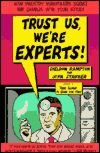 |
Trust Us, We're
Experts! - How Industry Manipulates Science
and Gambles with Your Future
by Sheldon Rampton and John Stauber
The following review is from the Nov/Dec 2001 issue of Worldwatch
magazine:
"Have you ever wondered how a handful of
industry-paid scientists have been so effective at generating public
skepticism about the work of hundreds of scientists supporting
climate-change scenarios? Or why the sale of genetically modified
foods was approved in the United States without any serious research
on the long-term health and environmental risks? How about why the
tobacco industry was able to get away with lying about the deadly
nature of cigarettes for so long?
Trust Us, We're Experts, by
Sheldon Rampton and John Stauber of the Center for Media and
Democracy unearths the answers to these and many other questions,
and brings to light the techniques that corporations use to
manipulate the public and influence the findings of scientists. This
book is required reading for anyone serious about finding the facts
buried under the constant barrage of public relations hype that
dominates today's fast-paced, media-saturated environment." |
|
|
|
| |
| |
|